Fulfillment of Defense Reform 2.0 a public mandate
By Publisher Lee Kyung-sik with Political Editor Jeong Won-shik
President Moon Jae-in said, “National defense is the foundation of the country’s existence and the people’s survival and the completion of “Defense Reform 2.0,” established at the initiative of the Ministry of National Defense, is a public mandate and one of my Administration’s key state affairs.”
Speaking in a his opening remarks at the annual briefings by the Ministry of National Defense and the Ministry of Patriots and Veterans Affairs on Jan. 21, 2020, Moon then said, “The Government has drastically increased the defense budget to carry out the reform of national defense in a strong and speedy manner.”
Then he stated: “As a result, we have ushered in the era of a 50 trillion won defense budget this year, which marks a 10 trillion won increase in just two years since the launch of my Administration.”
“The defense budget and expenditures for improving defense capabilities under this Administration,” he noted, “have risen 7.6 percent and 11 percent on average annually, much higher than the rates under the two previous administrations.”
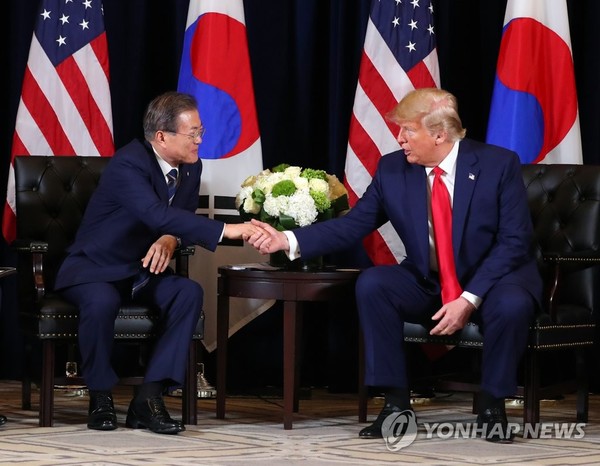
President Moon made the remarks amidst media reports and worries expressed by various sectors of Korean society that Moon is somewhat told apart from other members of the National Assembly and people in the Korean society, who are conservative minded and rightist-oriented.
Moon is frequently attacked by conservative and right-wing politicians and civic figures for ‘being somewhat leftist-oriented and pro-North Korean.’
Here are excerpts from one of typical examples published by Media Pen in Korea on Nov. 21, 2019:
Nightmare is becoming reality in the Republic of Korea in terms of her national defense and economy.
The Korea-United States national defense alliance, which forms the foundation of the prosperity and success of Korea, is shaken at its foundation and, resultantly, the national defense of Korea is rapidly falling into a state of extreme danger.
To make the situation worse, President Donald Trump, unlike his predecessors, no longer seems to attach so much importance to the security alliance between Korea and the U.S. as all his predecessors had done. Trump is appears to be much more interested I-in the economic gains of his country than in security alliance with other countries. Trump frequently mentions the possibility of reducing the U.S. Forces in Korea.
This is a serious matter. It is because if the reduction of the U.S. Forces in Korea really occurs there are possibilities of exit of foreign funds from Korea.
Credit evaluators, such as Moody's Corporation and S&P, could be encouraged to down-grade Korea’s credit rating if the security situation of the country is adversely affected. They did not change the credit status of Korea in the face of repeated provocations and threats from North Korea.
However, if there should occur instability in the alliance between Korea and the U.S., they might be encouraged to change the credit standing of Korea.
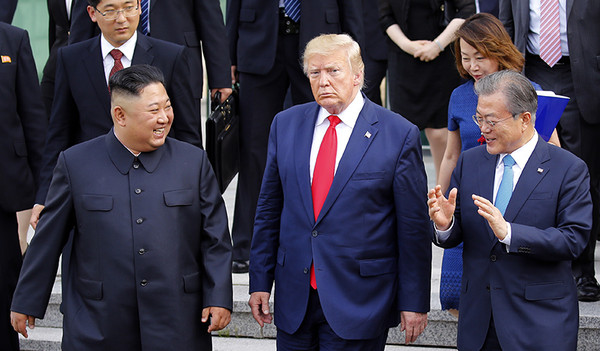
Negotiations between Korea and the U.S. are still in progress and yet final agreement has not yet been made.
Reports indicate that the U.S. Forces in Korea have started giving some of their 9,000 Korean employees leave without pay—pending a final agreement on the ROK-U.S. defense cost-sharing.
Ironically, however, this situation is favorably affecting the position of President Moon.
While Moon is considerably losing ground for his allegedly leftist-oriented political stance, he is gaining ground in his position to protect Korea from the amount of money demanded by Trump. This is because the successive governments of the U.S. have never demanded that sharp increase in the cost of the U.S. Forces in Korea. Normally, the annual increase rates, according to the Korean Ministry of National Defense figures, have been around 10%, as shown below:
W790.4 billion in 2010, W812.5 billion in 2011, W869.5 billion in 2013, W920 billion in 2014, W944.1 billion in 2016, W950 billion in 2017, W960 billion in 2018, and W1,038.9 billion in 2019. This year, according to Korean reports, the amount asked by the U.S. is 5 trillion and 900 billion Korean Won, which is more than five times the amount of the preceding year.
This situation is driving Moon and his government to bay and he is sandwiched between the progressive forces who are downright opposed to the unprecedented increase rate and the conservatives who try to find whatever fault that Moon and his government might have for their political gains.
There even are ungrounded rumors that Trump might be doing so because “Moon is trying to be overly ‘chummy’ with Chairman Kim Jong-Un of the North Korean regime.”
Moon is obviously going all out to keep the dialogue between President Donald Trump of the U.S. and Chairman Kim Jong-Un of North Korea. However, in spite of such arduous efforts on the part of Moon, Chairman Kim obviously is not honoring such sincere efforts and labor of Moon.
The North Korean media, which are largely controlled by the Workers Party of (North) Korea and the ruling class, continue to tell President Moon to ‘stay out’ from the direct negotiations between the U.S. and North Korea. Some of them are even ridiculing President Moon with remarks such as “Moon has no sense of his position between the DPRK and the U.S. We don’t want moon meddle in our negotiations with Trump.”
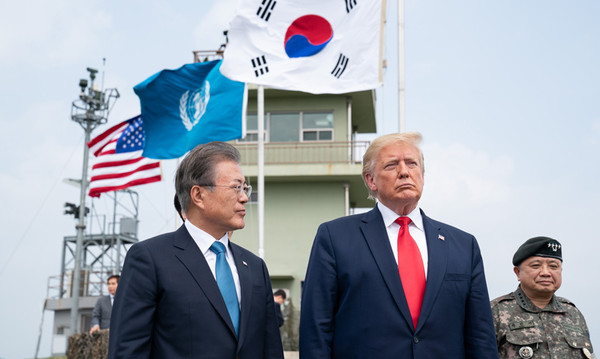
In any case, the U.S. pressure on Moon to more than quintuple the cost of the U.S. Forces in Korea, ironically, comes as a formidable supporter of Moon in the face of his decreasing popularity deriving from his allegedly support and sympathy with the progressive forces in Korea, whom the right wingers in Korea view as leftists. Some even tend to compare them to ‘Communist sympathizers.’
Speech of President Moon at the MND/MPVA meeting on Jan. 21, 2020:
I am glad to meet you all. Today’s briefings by the Ministry of National Defense and the Ministry of Patriots and Veterans Affairs regarding their undertakings are being held here in Gyeryongdae, the combined headquarters of the Army, Navy and Air Force. I was told that – in the history of the Ministry of National Defense – this is the first presidential briefing to be held here. I hope today’s briefings become an opportunity to renew our commitment to ensuring strong security backed by the solidarity of all the members of the Armed Forces and to providing a robust underpinning for peace and prosperity on the Korean Peninsula.
National defense is the foundation of the country’s existence and the people’s survival. The completion of “Defense Reform 2.0,” established at the initiative of the Ministry of National Defense, is a public mandate and one of my Administration’s key state affairs. The Government has drastically increased the defense budget to carry out the reform of national defense in a strong and speedy manner. As a result, we have ushered in the era of a 50 trillion won defense budget this year. This marks a 10 trillion won increase in just two years since the launch of my Administration. The defense budget and expenditures for improving defense capabilities under this Administration have risen 7.6 percent and 11 percent on average annually, much higher than the rates under the two previous administrations. I urge you to push for accelerated defense reform as it is being strongly supported by the Government with funds provided at the expense of the people.
Capable security and a formidable national defense are both our first and second-most important considerations. Most fundamental of the fundamental is establishing an ironclad defense posture that will not allow the slightest breach and that no one will dare challenge. Our ultimate goal of bringing peace and prosperity to the Korean Peninsula can only be achieved with the support of a formidable national defense.
Our military was able to faithfully implement the September 19 inter-Korean military agreement by, among others, demilitarizing the joint security area, phasing out guard posts within the Demilitarized Zone and carrying out inter-Korean joint excavations of the remains of those killed during the Korean War. At the same time, our Armed Forces were able to provide a stable buttress for the Korean Peninsula peace process. All of these have been possible due to the foundation of steadfast military preparedness. I compliment our military forces on their efforts to safeguard peace by following through on the September 19 military agreement and simultaneously maintaining a readiness posture in a stable manner. Moreover, I once again emphasize the fact that strong national defense capabilities are what will become the rock-solid foundation for peace.
We need comprehensive defense capabilities to prepare for conventional and non-conventional security threats that are becoming increasingly more diverse and sophisticated. Our goal is the creation of a strong, high-performing military capable of responding to all security environments. To date, our Armed Forces have intensively invested in making security assets related to surveillance and reconnaissance, strategic strikes and aerial refueling important parts of our military strength. We have to establish a national defense that allows us to assume responsibility by securing the operational ability to lead a combined defense while further cementing the ROK-U.S. combined defense posture and continually enhancing intelligence-sharing and joint response capabilities on the basis of a robust ROK-U.S. alliance. I ask you to gradually increase preparations as planned for setting the stage for the transfer of wartime operational control.
It is necessary to accelerate building a strong, digitalized military and smart national defense by applying Fourth Industrial Revolution-related technologies more actively. This pertains to a strategy to build an efficient weapons system with a small outlay while at the same time preparing for a newly emerging pattern of threats stemming from Fourth Industrial Revolution technologies. In the course of incorporating the private sector’s advanced technologies into our military strength and transferring new technologies that have been proven by the military to the private sector, we can make significant contributions to the growth of private companies. I look forward to innovation in national defense that will strengthen the military and the private sector as well by swiftly applying the latest military science and technology to our national defense capabilities.
The national defense industry can be of help to both security and the economy. To date, the Government has provided support to lay the groundwork for the defense industry’s innovative growth by formulating a vision to develop it into an export-driven industry, going beyond the localized production of high-tech weapons. The number of countries that cooperate with the Republic of Korea on the national defense and defense industry fronts, including those linked to the New Southern Policy, has also increased significantly. I ask you all to work very hard to ensure that the efforts made thus far bear fruit this year.
Meanwhile, we have to ensure that a military culture that can meet the public’s expectations takes root. A military whose members have high morale is a strong one, as is a military that has the confidence of the parents whose sons and daughters are serving. There have been significant improvements in service members’ welfare and human rights. As promised upon the inauguration of my Administration, we have raised soldiers’ monthly pay by 150 percent over the past two years: For sergeants, the amount has exceeded 540,000 won this year. Going forward, we will continue to make increases.
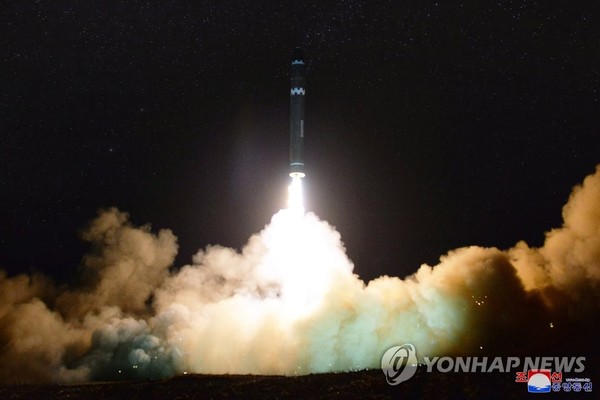
What I want to emphasize in particular is the safety of military personnel. It’s important to ensure that safety accidents in the military are no longer criticized as the result of human error. I ask you to work harder to not only improve the medical system, including the establishment of an emergency evacuation system, but also to build a safety management system that can predict the risk of accidents and prevent them in advance. Special endeavors are also required to achieve gender equality in the military, increase the number of female soldiers and support a work-life balance.
Providing welfare support to veterans and patriots is a shortcut to uniting the people and a starting point of a strong national defense. My Administration has drastically improved the way people of national merit are treated under the governing philosophy that a nation that properly rewards their sacrifice and dedication is a just one. The Government’s philosophy with regard to taking care of veterans and patriots must take root firmly wherever veterans affairs are handled. Properly honoring veterans and patriots is indeed a source of patriotism. I ask you to pay more careful attention to providing the recipients of veteran services with treatments that are appropriate for their situations, for instance, by allowing them to use hospitals near their homes since most of them are senior citizens. More efforts will also have to be made to help military personnel who retire after mid- to long-term service receive vocational training or begin new careers.
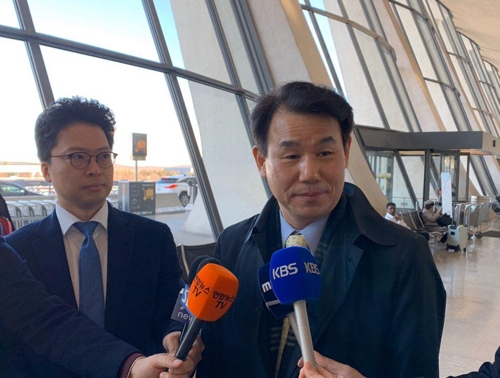
In particular, this year has many anniversaries that are multiples of 10. In addition to the centennial for the battles of Qingshanli and Fengwudong, the 70th anniversary for the Korean War, the 60th anniversary of the April 19 Revolution and the 40th anniversary of the May 18 Democratization Movement are the ones that symbolize our modern history that has been marked by independence, the defense of our fatherland and democratization. I hope that these anniversaries will be commemorated together by and among the people and serve as opportunities to restore their true meanings in our country today.
Regrettably, the battles of Qingshanli and Fengwudong are relatively unknown, though they were the most shining victories in the history of the independence movement against Japanese colonialism. I would like to see the Government provide active support for special commemoration of the centennial so that it serves as an opportunity for us to boost our pride and reflect on patriotism.

